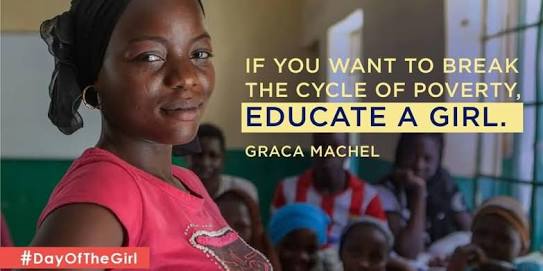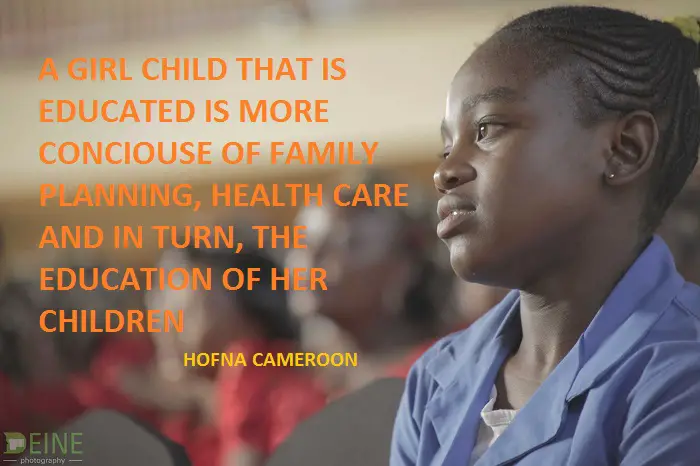Girl child education is crucial for the development and progress of society. Educating girls helps break the cycle of poverty and improves the living standards for individuals and communities.
Education is a human right that every child, regardless of gender, should have access to. Unfortunately, this is not the case in many parts of the world where girls are denied the opportunity to receive an education. The reasons for this can range from poverty, cultural beliefs, and societal norms that prioritize boys’ education over girls’. However, the importance of girl child education cannot be overstated. Educated girls are more likely to enter the workforce, earn higher wages, and make more informed decisions about their health and well-being. Not only does educating girls benefit individuals, but it also has a positive impact on society as a whole, promoting gender equality and breaking the cycle of poverty. In this article, we will further explore the importance of girl child education and its various benefits.
.jpg)
Credit: steemit.com
Benefits Of Educating The Girl Child
Empowering girls with education is a vital step towards achieving gender equality and promoting sustainable development. It has numerous benefits, including economic, health, and social advantages.
Economic Benefits
Investing in girl child education holds the potential to increase a country’s economic growth.
- An educated girl will earn higher wages leading to increased income, improved living standards, and a rise in the family’s socio-economic status.
- Girls who receive education tend to marry later and have fewer children, thereby reducing the population explosion rate and increasing the working-age population.
- Economically empowered girls are more likely to invest their earnings back into their family’s education and health, creating a cycle of positive development.
Health Benefits
Educating the girl child plays a crucial role in improving the health and well-being of girls, their families, and the nation.
- Educated girls are more informed about health issues and can take better care of themselves and their families, reducing maternal and child mortality rates.
- Education empowers girls and helps them make informed decisions about their health, leading to improved sanitation, hygiene, and nutrition.
- When girls receive education, they are less likely to contract sexually transmitted diseases, including hiv/aids, and have healthier pregnancies.
Social Benefits
Educating girls has numerous social benefits that transform communities and shape societies.
- An educated girl is more confident and better able to contribute to decision-making processes in her family and community.
- Education exposes girls to new ideas and perspectives, breaking traditional gender roles and increasing their independence.
- Girls who receive education more readily participate in society and play a meaningful role in nation-building, enhancing overall development and social justice.
Educating the girl child is an essential step towards promoting sustainable development and achieving gender equality. The economic, health, and social advantages of girl child education significantly impact families, communities, and nations, shaping a better future for all.
Challenges Facing Girl Child Education
The education of the girl child has been a topic of concern for policymakers and educationists. The struggle to provide girls with the same educational opportunities as their male counterparts remains a significant challenge. Although progress has been made, it’s essential to understand the challenges that threaten the education of girl children; some of these challenges are discussed below using the markdown format.
Poverty
Poverty continues to be one of the biggest obstacles to girl child education. In impoverished regions, the need to provide food, shelter, and clothing takes priority over education, girls, being the more vulnerable, often miss out on their chance to attend school.
- Lack of access to healthcare and poor sanitation facilities. Education may take a backseat as families struggle to cater to their basic needs.
- Lack of proper infrastructure such as schools, toilets, classrooms, and books, making it difficult to provide quality education to the girl child.
Social And Cultural Norms
In many parts of the world, social and cultural norms have created barriers to girl child education. Society believes that girls should be married off, become homemakers, and not pursue an education; this has led to early marriage and female genital mutilation.
- Discrimination, girls are often considered inferior to boys, denying them equal opportunities.
- Conflicts like wars, which may lead to displacement of families, making it impossible for girls to access education.
- Lack of female teachers in schools, which may leave girls uncomfortable and unable to seek guidance or mentorship from role models.
- Public safety – the concern for the safety of the girl child may prohibit parents from allowing their daughters to attend school. Fear of sexual harassment, assault, and violence during the commute to school or on school premises remains a threat to girls’ education.
It’s vital for us to recognize these challenges in the fight for the girl child’s education. Governments, non-governmental organizations, and communities need to work together to overcome these obstacles. Empowering girls with an education provides them with the tools for a better life and a better future.
Educating a Girl Child Importance
Initiatives And Interventions Promoting Girl Child Education
Government Policies And Programs
The government’s efforts to ensure access to education for all girls in the country are commendable.
- The sarva shiksha abhiyan, a flagship program aimed at providing elementary education to all children.
- The rashtriya madhyamik shiksha abhiyan, a program aimed at enhancing access to secondary education for girls.
- The beti bachao, beti padhao campaign, which focuses on the eradication of female foeticide and encouraging their education.
- The pradhan mantri kaushal vikas yojana, which is aimed at offering skill-based training for adolescent girls from disadvantaged communities.
Ngo Programs And Community-Based Initiatives
Various ngos and community-based organizations have initiated programs to promote girl child education.
- Girl rising, an international ngo that aims to empower girls by enhancing their access to education.
- Educate girls, an ngo that operates in rural and remote areas, providing education to girls who have either never been to school or are at risk of dropping out.
- Parinaam foundation, a delhi-based ngo that has set up learning kits to provide education to girls living in slums.
- Digital study hall, an ngo that operates in uttar pradesh, using technology to enhance access to education for girls.
These initiatives and interventions promoting girl child education have significantly improved the situation in the country, but much more needs to be done. By providing opportunities for girls to access quality education, we are building a better and brighter future for our nation.
Success Stories And Impact Of Girl Child Education
Girl child education has been an issue of concern for years, particularly in developing countries. Governments and non-governmental organizations have consistently advocated for gender equality in education, stressing the importance of educating girls. The benefits of girl child education are numerous, not only for girls but for their families and communities.
One of the essential benefits of girl child education is success stories and the impact it has on the lives of girls.
Case Studies Of Successful Education Programs
Several organizations have implemented girl child education programs, some of which have been successful.
- In ethiopia, the government adopted a new education policy that requires every household to send their daughters to school. As a result, the number of girls enrolling in school has increased significantly, and the gender gap in education has reduced.
- Plan international, a non-profit organization, introduced a girls’ education program in uganda, providing scholarships, teaching materials, and teacher training to girls. The program’s success led to increased enrollment of girls in schools.
Positive Impact On Girls’ Lives
Girl child education significantly impacts the lives of girls, beyond academic and career advancements.
- Empowerment: educated girls are more likely to be confident and assertive, challenging gender stereotypes and advocating for their rights.
- Health: educated girls take better care of themselves and their families. They have more knowledge about healthcare, family planning, and disease prevention.
- Poverty reduction: educated girls are more likely to find jobs and earn a higher income, leading to the reduction of poverty levels in households and communities.
- Reduced child marriage: educated girls delay marriage until they are ready, and they have greater influence in decision making, which can lead to changes in attitudes towards early marriage.
The education of the girl child is a crucial issue that requires attention globally. With the implementation of successful education programs, the positive impact of girl child education on various aspects of girls’ lives is evident. It is imperative to continue advocating for girl child education, for the benefit of current and future generations.
Frequently Asked Questions Of Importance Of Girl Child Education
What Are Some Of The Significant Benefits Of Educating Girls And Why Is It Important For Gender Equality?
Educating girls has significant benefits such as reducing child marriages, improving health and economic outcomes, and building stronger communities. Gender equality is important because it creates an inclusive and fair society where everyone has equal opportunities to succeed in life.
When girls are educated, they can become empowered leaders and agents of change in their families, communities, and countries.
What Are The Barriers And Challenges That Girls Often Face When Trying To Access Education, Particularly In Developing Countries?
Girls in developing countries face several challenges in accessing education, including poverty, early marriage, cultural norms, lack of schools, and gender-based violence. These barriers often force girls out of school and limit their opportunities for a brighter future.
How Can We Empower And Support Young Girls To Stay In School And Pursue Their Education To The Highest Level Possible?
To empower and support young girls to pursue education, we must provide equal opportunities, safe environment, access to resources and mentorship. By promoting and investing in girls’ education, we can break the cycle of poverty and positively impact their future and the community around them.
What Can Be Done At A National Or Global Level To Improve Access To Education For Girls And Address The Gender Gap In Education?
Improving access to education for girls and addressing the gender gap requires multiple initiatives at a national and global level. These include eradicating poverty, providing scholarships, education infrastructure, and gender-bias-free teaching. Governments and non-governmental organizations must work together to ensure policies and programs that promote girls’ education are implemented effectively.
How Does Educating Girls Impact Their Future Opportunities, Including Economic, Social, And Personal Growth?
Educating girls leads to improved future opportunities including economic, social, and personal growth. Educated women are more likely to secure better-paying jobs and have better decision-making capabilities. Girls’ education helps break the cycle of poverty, reduce child and maternal mortality rates and improve child nutrition, and lower birth rates, while also empowering women to take charge of their lives.
Conclusion
In a world where gender inequality still exists, educating the girl child has become an essential step towards building a better future. With access to education, girls are empowered to make informed decisions, pursue their ambitions and break free from the cycle of poverty.
It provides them with a solid foundation for a better quality of life, better career opportunities, and social mobility. Educated girls can contribute significantly to society as a whole, be it through entrepreneurship, innovation, or civic engagement. As we strive towards a more equitable and sustainable world, it is imperative that we invest in the education of girls.
As nelson mandela once said, “education is the most powerful weapon which you can use to change the world”. It is time to recognize that the girl child deserves this weapon too! So let us all pledge to support and promote girl child education to build a brighter tomorrow for all.

